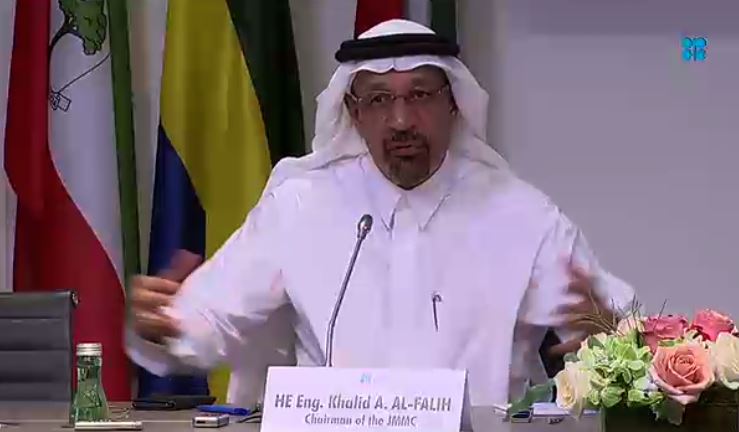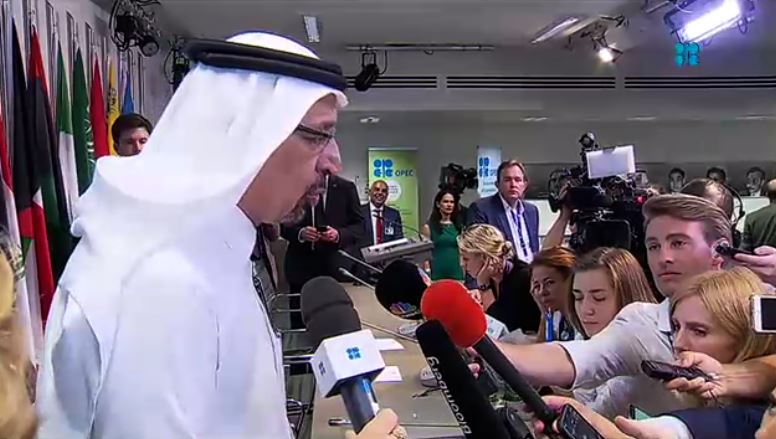I have no doubt U.S. shale will peak, plateau and decline
By Bevo Beaven, Editor, Oil & Gas 360
At today’s press conference following OPEC’s annual meeting in Vienna, Saudi Arabia’s Minister of Energy, Industry and Mineral Resources Khalid Al-Falih, also the chairman of the Joint Ministerial Monitoring Committee of OPEC+ (OPEC plus non-OPEC countries), said the OPEC+ group had agreed to continue production curtailments for up to nine more months.

Al-Falih, who is a graduate of Texas A&M (mechanical engineering) and Saudi Aramco chairman, said the ministers welcome making the cooperation between OPEC and non-OPEC a permanent framework that would “always bring producers from both sides together in a regular structured format to analyze markets and to consider what action, if any, that needs to be taken to maintain the balance we have achieved since the beginning of 2017.
“The commitment to a nine-month extension is unequivocal, very solid, very strong. … That gives me a great deal of confidence that as high as the collective conformity has been for the first half of the year, I am confident that the second half is going to be even better and more uniform. … Ministers who had some issues making their numbers have assured me that the second half is going to be different,” he said.
“Everybody came together to ultimately support a permanent charter for cooperation with non-OPEC countries,” Al-Falih said.
We manage inventories
“Ultimately we measure our success by how we manage inventories,” Al-Falih said. “We’re not in the business of driving prices one way or another. Pricing is of course an outcome, but what we strive for is the fundamentals. We try to induce demand going forward by assuring the viability of supply, security of supply, and we will always be moderate in our approach, but we will assure the market that we will manage supply directly, by ensuring that we don’t flood the markets nor do we cause a shortage. Which is what we try to do with our coordination.
“And the ultimate method that balances the two is inventories. … Inventories have gotten out of our hands the last few months. It’s unfortunate but they did. It’s not easy to predict where supply and demand are going, and I think it’s fair to say over the last few months inventories did build in a manner that we would like to avoid.”
[contextly_sidebar id=”QmvzarFpcVYExzUPJVr1EeUJqc0DHg4O”]Al-Falih said that “going forward we’re going to bring inventories down.” He said that three groups agreed—JMMC, the JTC and the OPEC conference—that they are going to bring inventories down to the 2010-2014 range, rather than “the bloated five-year average that has increased unreasonably given the last high inventory years.”
Al-Falih said that the groups recognize that Q1 2020 “is likely to be soft demand and exiting in December would have been unwise.”
Al-Falih was asked about the booming, record U.S. production. He responded, “In terms of U.S. production, I think it goes both ways. He said some would argue that because of U.S. shale and the increases in U.S. production, that would have “undermined the enlargement of the circle of new entrants [to OPEC+],” because of countries not wanting to lose market share.
I have no doubt U.S. shale will peak, plateau and decline
But Al-Falih compared U.S. shale to North Sea production and its effect on the global oil supply.
“North Sea production came strong and impacted markets but ultimately started declining. I have no doubt in my mind that U.S. shale will peak, plateau and decline like every other basin in history. The question is ‘when?’. Until it does I think it’s prudent for those of us who have a lot at stake, and also for those of us who want to protect the global economy and provide visibility going forward to keep adjusting to [U.S. production].”

When asked about the other OPEC+ group countries who may wish to increase production, Al-Falih said he is in frequent communication with the other OPEC+ ministers. He said he closely watches what the other countries do with respect to oil production. “I have my fellow OPEC ministers on my speed dial and WhatsApp.”
He said that Saudi Arabia does expect to continue its reduction of crude oil burn, a reference to the number of barrels of crude oil that the kingdom burns to produce electricity. He assured the press, saying, “These barrels will not be pushed into the market.” He reminded the audience that Saudi Arabia has 2.3 million barrels of spare capacity.







